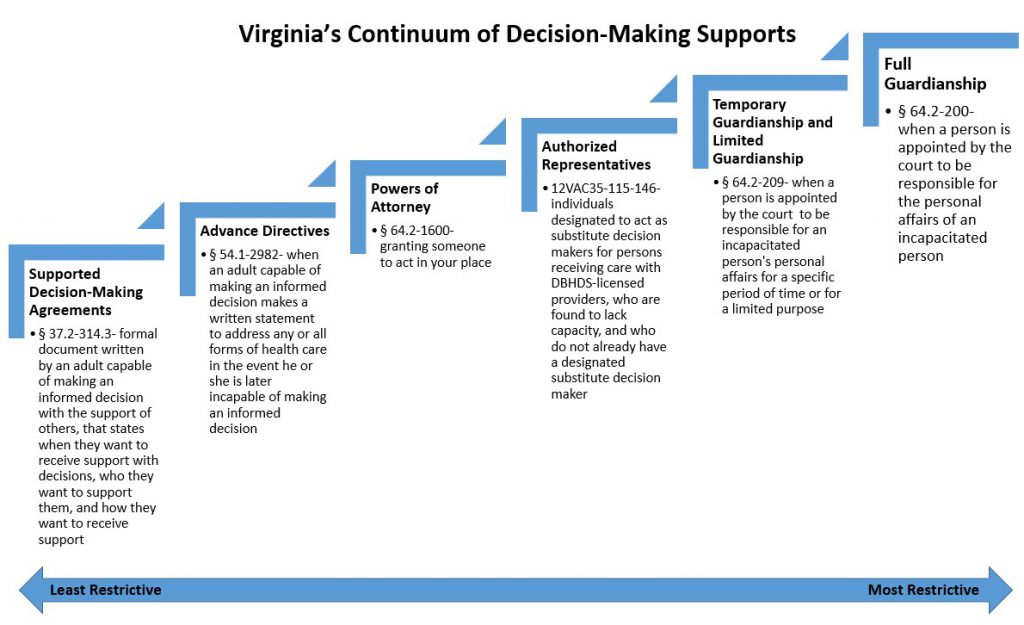Virginia now formally recognizes Supported Decision-Making Agreements as an alternative to more restrictive, substitute decision-making options, such as legal guardianships (Virginia Code § 37.2-314.3.). Supported Decision-Making Agreements are a way for adults with developmental disabilities living in Virginia to document when they want to receive support with making decisions, how they want to receive support, and who they want to help them. Supported Decision-Making Agreements give individuals with developmental disabilities the ability to receive support with making various choices in their lives, while also retaining all of their rights, including the right to make their own decisions.
For questions regarding Supported Decision-Making and/or Supported Decision-Making Agreements please contact Sara Thompson at Sara.Thompson@dbhds.virginia.gov.
Making My Own Decisions- It’s My Right!
Everyone has the right to meaningfully participate in making decisions about their life. Human Rights Regulations say that anyone who has capacity (can take in information, make a decision using that information, and then communicate their decision to others) can consent (agree) to services, treatment, or research, or agree for others to see and/or get information about them. Even if you have capacity, you still might want help with making some decisions and that is okay. If you have questions about your right to make decisions or about your other rights, please see information on the Office of Human Rights’ website by clicking here.
Click HERE to download and print your own It’s My Right! pocket card and letter. These can help you explain to others your right to make your own decisions.
Click the buttons below to learn more about supported decision-making and supported decision-making agreements.
Supported Decision-Making- Making a decision with the help of people you trust. They help you think about your different options, but you make the final decision.
Supported Decision-Making Agreement- A way to show in writing who you want to support (help) you, in what areas of life, and how you want to be supported. You can change or cancel it at any time. The Decision Maker and their Supporters (or helpers) all agree to what is written in the Supported Decision-Making Agreement.
Supported decision-making and Supported Decision-Making Agreements help individuals with disabilities get help with making decisions while keeping their legal rights and ability to make the final decision. They also help to increase independence and control over their own life (self-determination). It is free and considered to be a least restrictive option for getting help with making decisions.
Supported Decision-Making Agreements (SDMAs) are made up of a Decision Maker and at least one Supporter. You can have many Supporters and you can also have as SDMA Facilitator, but this is optional.
Decision Maker- The creator of the Supported Decision-Making Agreement. You must be at least 18 years old, have a diagnosis of an intellectual or developmental disability, and not have a legal guardian or conservator.
Supporters– The people you trust and select to help you understand and make choices.
Supported Decision-Making Facilitator– The person you select to help make sure your agreement is working and everyone is doing their part. This is not required and the person may also be one of your Supporters.
While you have to be at least 18 years old to create a Supported Decision-Making Agreement, you can use supported decision-making at any age to help with making choices and increasing self-determination. You can also start the discovery process and talking about decision making before someone turns 18. Learning to make choices takes time and should be practiced from an early age. There are tools that can help you start the discovery process and talk about decision-making on the DBHDS website.
Supported Decision-Making Agreements can be made by you and the people you trust to be your Supporters. You can talk with the people you trust and use the activity sheets (Discovery Tools) to help you think about what you want or need help with, how you want help, and who you want to help you. You can use Virginia’s Supported Decision-Making Agreement form or your own form. You can download the Discovery Tools and the Virginia Supported Decision-Making Agreement template below.
If you make your own Supported Decision-Making Agreement form, make sure it includes these things: who you want as your Supporter(s), when you want help, how you want to receive help. Make sure that you and your Supporter(s) agree to the information and sign the form.

Virginia’s Supported Decision-Making Agreement template and Supplemental Documents/ Acuerdo para la toma de decisiones con apoyo del Estado de Virginia – Plantilla
Overview
Documents to help answer questions about supported decision-making and supported decision-making agreements.
- Supported Decision-Making Quick Reference Document
- Supported Decision-Making FAQ (Plain Language)- UPDATED
- Supported Decision-Making FAQ- UPDATED
Virginia’s Supported Decision-Making Agreement template and Instructions
- Instructions for Completing Your Supported Decision-Making Agreement
- Virginia’s Supported Decision-Making Agreement template (Word)
- Virginia’s Supported Decision-Making Agreement template (PDF)
Tool Kit
Discovery Tools and forms you can use to help you create your Supported Decision-Making Agreement or to use on their own.
- Discovery Tool- When Do I Want Support (Word)
- Discovery Tool- When Do I Want Support (PDF)
- Discovery Tool- What Kind of Support Do I Want (Word)
- Discovery Tool- What Kind of Support Do I Want (PDF)
- Discovery Tool- Relationship Map (Word)
- Discovery Tool- Relationship Map (PDF)
- Who Do I Want to be My Supporters (Word)
- Who Do I Want to be My Supports (PDF)
- Who has a copy of my Supported Decision-Making Agreement tracker (Word)
- Who has a copy of my Supported Decision-Making Agreement tracker (PDF)
Release of Information Forms
Release of information forms for school and doctor’s offices written in plain language.
Examples
Examples of completed Discovery Tools and Supported Decision-Making Agreements.
Preguntas frecuentes
Acuerdo e instrucciones para la toma de decisiones con apoyo
- Cómo completo mi acuerdo de toma de decisiones con apoyo
- Mancomunidad de Virginia- Acuerdo de toma de decisiones con apoyo (Documento de Microsoft Word)
- Mancomunidad de Virginia- Acuerdo de toma de decisiones con apoyo (Formularios PDF rellenables)
Herramientas
- Herramienta- Cuándo quiero el apoyo (Documento deMicrosoft Word)
- Herramienta- Cuándo quiero el apoyo (Formularios PDF rellenables)
- Herramienta- Qué tipo de apoyo quiero (Documento deMicrosoft Word)
- Herramienta- Qué tipo de apoyo quiero (Formularios PDF rellenables)
- Herramienta- Mapa relacional (Documento deMicrosoft Word)
- Herramienta- Mapa relacional (Formularios PDF rellenables)
Formularios de liberacion de informacion
Modelo
Training Videos and Documents
Supported Decision-Making in Virginia: An Overview for CSBs and Providers
Recordings
- January 16, 2024
- April 16, 2024
- July 16, 2024
- October 15, 2024
Slides
Supported Decision-Making in Virginia: An Overview for People with DD and Their Families
Recordings
- February 20, 2024
- May 21, 2024
- August 20, 2024
- November 19, 2024
Slides
The Spectrum of Decision-Making Options in Virginia: Supported Decision-Making to Guardianship & Everything In Between
Recordings
- March 19, 2024
- June 18, 2024
- September 17, 2024
- December 17, 2024
Slides
Learn about the different types of decision-making support in Virginia, eligibility for each type of support, and how to access each type of support. Also learn what types of supports can be combined and what types cannot.
Recording
Slides
Questions and Answers from Live Trainings
Decision Making Compatibility Chart
A list of decision-making support options, what types of support you can have at the same time and what types of support you cannot combine.
Learn how to fill out each of the 3 Discovery Tools and how to use them to fill out your own Supported Decision-Making Agreement.
Recordings
- Session 1: What is Supported Decision-Making and What Kind of Support Do I Want?
- Session 2: When Do I Want Support?
- Session 3: Relationship Map and Selecting Your Supporters
- Session 4: Virginia’s Supported Decision-Making Agreement template
Slides
Learn how to fill out each of the 3 Discovery Tools and how to use them to fill out your own Supported Decision-Making Agreement.
Recordings
- Recordings of all 4 sessions can be viewed by clicking here- PEATC Videos
Slides
Learn the definitions of abuse, neglect, and exploitation, how to identify them, and how to respond to them. Also, learn about the 3 Discovery Tools that you can use to help create your own supported decision-making agreement, as well as the Virginia Supported Decision-Making Agreement template.
Recordings
- Supported Decision-Making and Supported Decision-Making Agreements: The Details Session 1 for Individuals and Families *Coming Soon*
- Supported Decision-Making and Supported Decision-Making Agreements: The Details Session 2 for Individuals and Families *Coming Soon*
- Supported Decision-Making and Supported Decision-Making Agreements: The Details for Providers
Slides
- Supported Decision-Making and Supported Decision-Making Agreements: The Details Session 1 for Individuals and Families
- Supported Decision-Making and Supported Decision-Making Agreements: The Details Session 2 for Individuals and Families
- Supported Decision-Making and Supported Decision-Making Agreements: The Details for Providers
Questions and Answers from Live Trainings
Learn about the history of supported decision-making across the world, in the United States, and in Virginia. Learn about Virginia’s progress towards creating a supported decision-making agreement template for Virginians to use.
Recordings
- Supported Decision-Making and Supported Decision-Making Agreements: An Overview for Individuals and Families
- Supported Decision-Making and Supported Decision-Making Agreements: An Overview for Providers
Slides
- Supported Decision-Making and Supported Decision-Making Agreements: An Overview for Individuals and Families
- Supported Decision-Making and Supported Decision-Making Agreements: An Overview for Providers
Questions and Answers from Live Trainings
Other Resources
To get more help with decision-making options and supported decision-making agreements click below.
-
- Virginia WINGS booklet
- For assistance using supported decision-making to remove a legal guardianship or conservatorship, contact the disAbility Law Center of Virginia by using this form.
Reports
- Report on House Bill 2230: Supported Decision-Making Report *Coming Soon*
- Supported Decision-Making Project Report 2022

